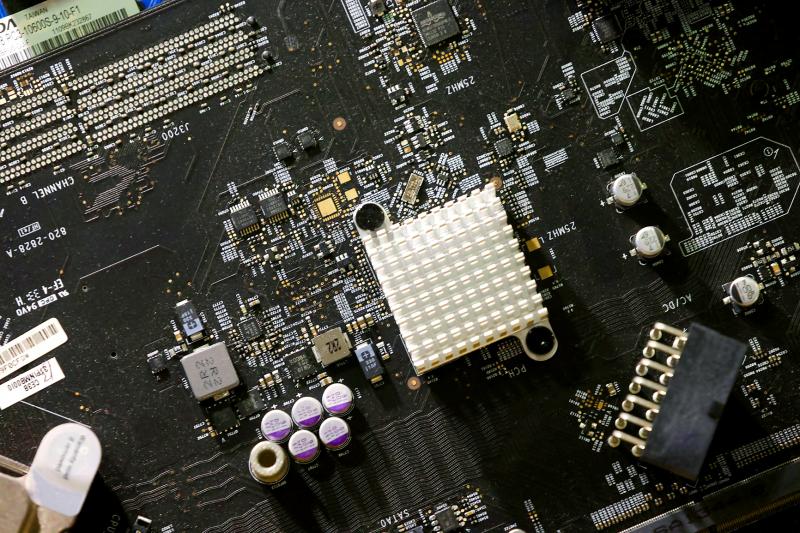GlobalFoundries Inc, the biggest US-based provider of made-to-order semiconductors, gave a bullish forecast for the current quarter, indicating the rush to get chips continues amid industry-wide shortages.
Sales would be US$1.88 billion to US$1.92 billion in the period ending next month, the Malta, New York-based company said in a statement on Tuesday.
Profit, excluding certain items, would be US$0.21 to US$0.27 a share. Those predictions compare with analysts’ average estimates of US$1.84 billion and US$0.14 a share.

Photo: Reuters
GlobalFoundries, majority owned by the government of Abu Dhabi, began life as a publicly traded company in October last year. The chipmaker, which is a fraction of the size of market leader Taiwan Semiconductor Manufacturing Co (台積電), is trying to carve out a larger slice of the market for outsourced semiconductor production.
Chief executive officer Tom Caulfield and his counterparts at other chipmakers are trying to convert the demand spike into long-term commitments from customers with the aim of stabilizing their growth and profitability.
They also hope to increase capacity by using proposed government incentives to build facilities in the US and Europe.
Investors should have confidence that the industry is going to avoid past cycles of boom followed by gluts if sales double as projected to US$1 trillion in 10 years, Caulfield said in an interview.
Current plans for factory expansion still would not keep up with that pace of growth, he said.
Furthermore, GlobalFoundries is only adding capacity when it gets financial commitments from customers who are seeking guaranteed supply.
Chipmakers are no longer building plants based on forecasts hoping orders will show up, he said.
GlobalFoundries shares have increased 19 percent to US$56.05 since October last year, when a slice of the company began trading on the public markets, beating overall gains by chip stocks. They rose about 3.5 percent in extended trading following the report.
Fourth-quarter revenue jumped 74 percent to US$1.85 billion. Profit was US$0.18 a share, excluding certain items.
Analysts, on average, projected US$1.81 billion and US$0.09, data compiled by Bloomberg showed.

SELL-OFF: Investors expect tariff-driven volatility as the local boarse reopens today, while analysts say government support and solid fundamentals would steady sentiment Local investors are bracing for a sharp market downturn today as the nation’s financial markets resume trading following a two-day closure for national holidays before the weekend, with sentiment rattled by US President Donald Trump’s sweeping tariff announcement. Trump’s unveiling of new “reciprocal tariffs” on Wednesday triggered a sell-off in global markets, with the FTSE Taiwan Index Futures — a benchmark for Taiwanese equities traded in Singapore — tumbling 9.2 percent over the past two sessions. Meanwhile, the American depositary receipts (ADRs) of Taiwan Semiconductor Manufacturing Co (TSMC, 台積電), the most heavily weighted stock on the TAIEX, plunged 13.8 percent in

A wave of stop-loss selling and panic selling hit Taiwan's stock market at its opening today, with the weighted index plunging 2,086 points — a drop of more than 9.7 percent — marking the largest intraday point and percentage loss on record. The index bottomed out at 19,212.02, while futures were locked limit-down, with more than 1,000 stocks hitting their daily drop limit. Three heavyweight stocks — Taiwan Semiconductor Manufacturing Co (TSMC, 台積電), Hon Hai Precision Industry Co (Foxconn, 鴻海精密) and MediaTek (聯發科) — hit their limit-down prices as soon as the market opened, falling to NT$848 (US$25.54), NT$138.5 and NT$1,295 respectively. TSMC's

TARIFFS: The global ‘panic atmosphere remains strong,’ and foreign investors have continued to sell their holdings since the start of the year, the Ministry of Finance said The government yesterday authorized the activation of its NT$500 billion (US$15.15 billion) National Stabilization Fund (NSF) to prop up the local stock market after two days of sharp falls in reaction to US President Donald Trump’s new import tariffs. The Ministry of Finance said in a statement after the market close that the steering committee of the fund had been given the go-ahead to intervene in the market to bolster Taiwanese shares in a time of crisis. The fund has been authorized to use its assets “to carry out market stabilization tasks as appropriate to maintain the stability of Taiwan’s

In a small town in Paraguay, a showdown is brewing between traditional producers of yerba mate, a bitter herbal tea popular across South America, and miners of a shinier treasure: gold. A rush for the precious metal is pitting mate growers and indigenous groups against the expanding operations of small-scale miners who, until recently, were their neighbors, not nemeses. “They [the miners] have destroyed everything... The canals, springs, swamps,” said Vidal Britez, president of the Yerba Mate Producers’ Association of the town of Paso Yobai, about 210km east of capital Asuncion. “You can see the pollution from the dead fish.